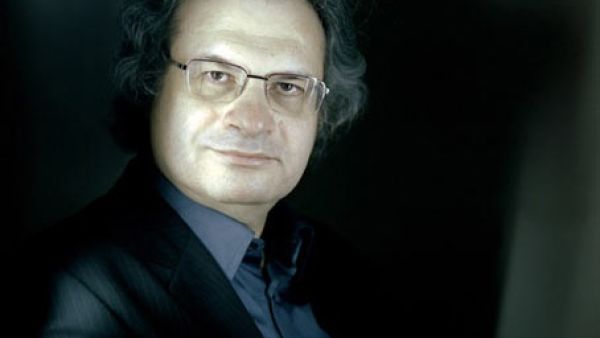Lebanese novelist Amin Maalouf was due to be formally received Thursday into the Académie française, the second writer of Arab origin to gain membership of the august cultural institution after Algeria's Assia Djebbar in 2005. He was elected to the body in June last year, to its 29th seat, formerly occupied by the anthropologist Claude Levi-Strauss.
Maalouf‘s election was well received in both French and Arab cultural circles. (The Governor of the Bank of Lebanon ordered the minting of a special issue of pure silver one pound coins bearing the writer's image to mark the occasion). It was also unexpected, as he had been renowned for preferring "the solitude of books to the intellectual salons of Paris," in the words of the Algerian writer Kateb Yacine.
Maalouf used the prize money from the Prix Goncourt, which he won in 1993 for his novel The Rock of Tanios, to buy an isolated cottage on an island off France's Atlantic coast. There, he could devote himself to the manuscripts and papers that are his passage to the "enlightening gardens of history" from which he draws the inspiration for his literary works. Having settled in France after the outbreak of the Lebanese civil war in 1975, he became accustomed to spending only around two months a year in Paris - often as part of the promotion of his latest work - before retreating to his island sanctuary.
Unlike other eminent authors who opted to write in French, Maalouf did not turn his back on Arab readers, nor pander to the Western orientalist imagination.
Accordingly, friends were surprised at his willingness to join the Académie, which requires him to spend most of the year in Paris. His initial reaction to his election was a mixture of joy at being admitted to the venerable academic body, and sorrow at what he would have to give up. "I am pleased to be joining an ancient institution like the Académie française," he said. "That is of very important symbolic significance to someone like myself, who has decided to devote their life to writing. I will be an active member of the academy, even though that will deprive me of my greatest pleasure in life: the solitude of writing."
Maalouf's election to the Académie was an unprecedented act of recognition by the francophone establishment of the "culture of heterogeneity and equality" (to borrow from Kateb Yacine again). Maalouf did not follow in the footsteps of the Maghrebi pioneers of Franco-Arab literature in terms of their ideological indictment of the hegemonic neo-colonial baggage carried by the official institutions of francophonie. He has always been a contrarian, prepared to be a discordant voice, and to take risks with "what the French publishing industry expects from an Arab writer who has the honor of writing in the civilized white man's language" - as the late great Mohammed Deeb put it after he was awarded the Académie's Grand Prix de La Francophonie in 1994.
Novels like Leo the African, Samarkand, Ports of Call, and The Rock of Tanios established Maalouf's status as one of the best-known Arab writers in the West. But unlike other eminent authors who opted to write in French, Maalouf did not turn his back on Arab readers, nor pander to the Western orientalist imagination imbued with misconceptions, generalizations and stereotypes about the "exotic East." Rather, Maalouf's works sought to build connecting bridges between the Arab and Western worlds. They tried to provide an underpinning for cultural exchange between East and West, and for dialogue conducted on a basis of equality, rid of condescension or prejudice.
Since his first book, The Crusades Through Arab Eyes, published in 1983, Maalouf has not flinched from rowing against the prevailing current, and choosing a difficult course strewn with risks of rejection and misunderstanding. He has not hesitated to debunk the assumptions of official history as written from the perspective of the White Man and his superior, paternalistic civilization.
In his novels - which have been acclaimed worldwide and translated into 38 languages - Maalouf makes a point of providing Arab and Western readers with a different representation of a shared Mediterranean history, completely at odds with the official versions of history, which have always been written to suit the victors. He explains: "In my treatment of history, I try to shatter prejudices and established myths which I consider to be intellectually harmful. I try to highlight and value the uplifting and positive aspects of the Mediterranean mythology, such as Spain during the Andalusian age, when the three heavenly religions coexisted, or Iran at the time of the old poets and philosophers."
Maalouf makes a point of providing Arab and Western readers with a different representation of a shared Mediterranean history.
Maalouf does not tire in his sisyphean task of building bridges of commonality, dialogue, coexistence and tolerance between the two shores of the Mediterranean, undeterred by the blizzards of extremism and battle-cries of "clash of civilizations." This may explain the arguably excessive optimism that pervades some of his writing, especially his historical research and political reflections (such as Murderous Identities and Origins). He does not deny this, but adds that his positive takes on history do not entail distorting or falsifying it. "I appreciate that the Crusader wars and the colonial invasions were not aimed at cultural dialogue or sharing civilizations. I also know that many followers of the three heavenly religions curse the followers of the other two daily in their prayers. But there are always men and women who overcome the walls of hostility and prejudice, and succeed in forging bonds of fraternity, friendship and love, despite all the barriers and obstacles, and who look forward to building a shared and different future together. These are the people from whom I draw inspiration in my works and compositions."
Maalouf makes an analogy with the freshwater currents that can sometimes be found flowing beneath the sea, remaining pure in the salty ocean. "I feel in this quest as though I am on a search for these rare, pure currents in this harsh and worrisome world around us. I am constantly searching for new reasons to continue hoping and dreaming of a better human future. I do that in the full knowledge that if I took the opposite approach, searching for causes for despair and pessimism, I would doubtless find what I was looking for more quickly and easily.
Tell us what you think below:








